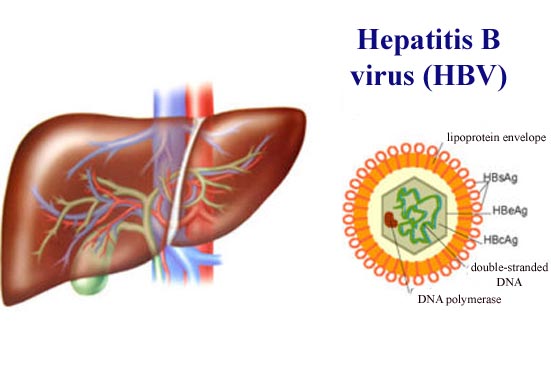Hepatitis B

Published: 18 Jun 2025
ICD9: 070.30 ICD10: B19.10 ICD11: 1E50.1
Hepatitis B is a serious liver infection caused by the hepatitis B virus (HBV).
It can be either acute (short-term) or chronic (long-term).
Here's a breakdown of key aspects:
What it is:
![]() Viral Infection: Hepatitis B is caused by the Hepatitis B Virus (HBV).
Viral Infection: Hepatitis B is caused by the Hepatitis B Virus (HBV).
![]() Liver Inflammation: The virus attacks and inflames the liver, which is a vital organ responsible for many functions, including processing nutrients, filtering blood, and fighting infections.
Liver Inflammation: The virus attacks and inflames the liver, which is a vital organ responsible for many functions, including processing nutrients, filtering blood, and fighting infections.
![]() Two Forms:
Two Forms:![]()

![]() Acute Hepatitis B: A short-term infection. Many adults clear the virus from their bodies, developing immunity.
Acute Hepatitis B: A short-term infection. Many adults clear the virus from their bodies, developing immunity.![]()

![]() Chronic Hepatitis B: A long-term infection. This occurs when the virus remains in the body. Chronic hepatitis B can lead to serious complications, including liver damage, cirrhosis (scarring of the liver), liver cancer, and liver failure.
Chronic Hepatitis B: A long-term infection. This occurs when the virus remains in the body. Chronic hepatitis B can lead to serious complications, including liver damage, cirrhosis (scarring of the liver), liver cancer, and liver failure.
How it's spread (Transmission):
HBV is spread through contact with infected blood, semen, or other body fluids. Common ways it's transmitted include:
![]() Sexual contact: Unprotected sex with an infected person.
Sexual contact: Unprotected sex with an infected person.
![]() Sharing needles: Injecting drugs with shared needles or syringes.
Sharing needles: Injecting drugs with shared needles or syringes.
![]() Mother to child: During childbirth (vertical transmission).
Mother to child: During childbirth (vertical transmission).
![]() Accidental needle sticks: Healthcare workers are at risk.
Accidental needle sticks: Healthcare workers are at risk.
![]() Sharing personal items: Such as razors or toothbrushes, although this is less common.
Sharing personal items: Such as razors or toothbrushes, although this is less common.
![]() Blood transfusions: Rare in developed countries where blood is screened.
Blood transfusions: Rare in developed countries where blood is screened.
![]() Tattoos and Piercings: If equipment is not properly sterilized.
Tattoos and Piercings: If equipment is not properly sterilized.
Symptoms:
Many people with hepatitis B, especially when newly infected, don't have any symptoms. When symptoms do occur, they can be similar to the flu. They may include:
![]() Jaundice: Yellowing of the skin and eyes.
Jaundice: Yellowing of the skin and eyes.
![]() Fatigue: Extreme tiredness.
Fatigue: Extreme tiredness.
![]() Abdominal pain: Especially in the upper right side.
Abdominal pain: Especially in the upper right side.
![]() Loss of appetite
Loss of appetite
![]() Nausea and vomiting
Nausea and vomiting
![]() Dark urine
Dark urine
![]() Clay-colored stools
Clay-colored stools
![]() Joint pain
Joint pain
Diagnosis:
Hepatitis B is diagnosed through blood tests that detect the presence of the virus, antibodies to the virus, and liver function.
Treatment:
![]() Acute Hepatitis B: Usually doesn't require specific treatment. Focus is on rest, proper nutrition, and monitoring liver function.
Acute Hepatitis B: Usually doesn't require specific treatment. Focus is on rest, proper nutrition, and monitoring liver function.
![]() Chronic Hepatitis B: Antiviral medications can help control the virus and prevent liver damage. Treatment doesn't always cure the infection, but it can significantly improve the prognosis. Regular monitoring is crucial to detect complications.
Chronic Hepatitis B: Antiviral medications can help control the virus and prevent liver damage. Treatment doesn't always cure the infection, but it can significantly improve the prognosis. Regular monitoring is crucial to detect complications.
![]() Liver Transplant: May be necessary in cases of severe liver damage or liver failure.
Liver Transplant: May be necessary in cases of severe liver damage or liver failure.
Prevention:
![]() Vaccination: The hepatitis B vaccine is highly effective in preventing infection. It is typically given as a series of shots, usually starting in infancy. Vaccination is the BEST way to prevent hepatitis B.
Vaccination: The hepatitis B vaccine is highly effective in preventing infection. It is typically given as a series of shots, usually starting in infancy. Vaccination is the BEST way to prevent hepatitis B.
![]() Safe Sex Practices: Use condoms during sexual activity.
Safe Sex Practices: Use condoms during sexual activity.
![]() Avoid Sharing Needles: Don't share needles or syringes.
Avoid Sharing Needles: Don't share needles or syringes.
![]() Safe Handling of Blood and Body Fluids: Healthcare workers should follow strict infection control procedures.
Safe Handling of Blood and Body Fluids: Healthcare workers should follow strict infection control procedures.
![]() Screening Pregnant Women: To prevent mother-to-child transmission.
Screening Pregnant Women: To prevent mother-to-child transmission.
![]() Safe Tattoo and Piercing Practices: Ensure facilities use sterile equipment.
Safe Tattoo and Piercing Practices: Ensure facilities use sterile equipment.
Complications of Chronic Hepatitis B:
![]() Cirrhosis: Scarring of the liver.
Cirrhosis: Scarring of the liver.
![]() Liver cancer (Hepatocellular carcinoma)
Liver cancer (Hepatocellular carcinoma)
![]() Liver failure
Liver failure
![]() Kidney disease
Kidney disease
![]() Blood vessel problems
Blood vessel problems
In summary: Hepatitis B is a potentially serious viral infection that can lead to significant liver damage. Vaccination is the most effective way to prevent it. Early diagnosis and treatment are crucial for managing chronic infections and preventing complications.